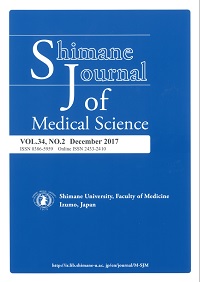Shimane University Faculty of Medicine
ISSN :0386-5959(in print)
ISSN :2433-2410(online)


These article are licensed under a Creative Commons Attribution-NonCommercial-NoDerivatives 4.0 International License.
number of downloads : ?
Use this link to cite this item : https://ir.lib.shimane-u.ac.jp/54355
Shimane Journal of Medical Science 39 1
2022-03 発行
Characteristics of People in Japan Based on Their Perceptions about Food-related Risks
Description
The terror attacks of 2001 increased the dangers of food terrorism worldwide. Similarly, in Japan, false labeling of food and the occurrence of health hazards caused by frozen dumplings produced in China increased awareness about food safety. This study aimed to clarify the characteristics of people perceiving the risk of food contamination. A questionnaire survey on a random sample of people assessed their awareness about food defense and hygiene. Topic analysis conducted with respondents as documents and question items as terms. Univariate linear regressions conducted with topics as the objective variables and other questionnaire items as explanatory variables to understand the topic characteristics. We found that topics regarding food from abroad and where they are sold were particular concern. This study revealed how food hygiene is taken for granted in Japan, and how food protection is considered an additional factor requiring utmost care.
About This Article
DOI
rights(link)

This article is licensed under a Creative Commons Attribution-NonCommercial-NoDerivatives 4.0 International License.
Rights
Faculty of Medicine, Shimane University
Other Article
PP. 33 - 39
